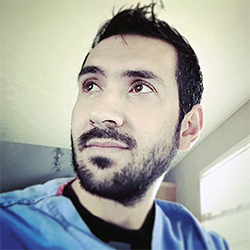Lung Cancer Survivor
 Morhaf Al Achkar is a physician, researcher, writer and Stage IV lung cancer patient. While not expecting the difficult diagnosis, he knew he was not the exception. He delved into a research project that not only brings meaning to his own life but draws attention to the resilience in the lives of other people with advanced lung cancer.
Morhaf Al Achkar is a physician, researcher, writer and Stage IV lung cancer patient. While not expecting the difficult diagnosis, he knew he was not the exception. He delved into a research project that not only brings meaning to his own life but draws attention to the resilience in the lives of other people with advanced lung cancer.
Physician Turned Patient Sharing Other Patients’ Stories
I felt short of breath and could not do simple exercises. Because I work at a primary care clinic, I asked a colleague to listen to my lungs. He noticed only a little air movement on the left side. An X-ray followed and showed my left lung space was nearly all white. I went to the emergency room for further testing. The CT of my chest showed massive amounts of fluid around the lung, which is called pleural effusion. It turned out to be malignant, and at 33, I was diagnosed with Stage IV lung cancer.
I practiced a full spectrum of family medicine, from delivering babies to treating people of all ages. Although I’m not an oncologist, I’ve treated patients with cancer and delivered cancer diagnoses to many patients. Still, my clinical experience did not prepare me for the existential and emotional burden of my diagnosis. It is different when you are the patient.
Further testing was planned for the day after Thanksgiving 2016, and an oncology appointment was set for Monday. I had the urgency to make things happen after speaking to a peer lung cancer patient who explained I should move fast. I needed genetic testing and to explore cutting-edge treatment options based on the test results. I asked my pathologist to order genetic testing, but he was unsure what to add. I wondered, should this not be automatic?
On Monday, my oncologist explained chemotherapy and radiation therapy are the palliative treatments for my cancer. He also mentioned genetic testing. I was eager for this testing, but like many people who are new to their serious diagnosis, the names of these genetic alterations (for example, EGFR, ROS1 and ALK) were just letters to me. As we waited for the results, I researched targeted therapies that may be available if I had a genetic mutation. When my test came back ALK-positive, I cried tears of joy. This meant I would be taking pills and would not have the burden of harsh chemotherapy. It also meant new treatments may be on the horizon.
I trusted my doctor but wanted as much information as possible, so I went to Boston for a second opinion. That oncologist confirmed the suggested treatment. I flew home to Indianapolis and took my first dose on December 13, about three weeks after being diagnosed.
The diagnosis and treatment took a toll on me. I was fatigued most of the time, and my breathing was recovering slowly. I took time off work to focus on what mattered most — staying alive.
My brain was busy thinking about my mortality, my life’s projects, what to continue, what to change. After two months, I eased back into my life projects. I continued working toward a PhD in education. I went back to work a couple days a week. I love my work. It is meaningful, and I always said I’d do it until I couldn’t anymore. Six months later, I moved to Seattle with my dog Leo for another teaching and clinic position I’d accepted two weeks before my diagnosis.
I will take the targeted therapy as long as it works. It has enabled me and many others with advanced-stage lung cancer to live longer than expected. For some of us, that means years instead of months.
As I grappled with questioning meaning in my life, I knew others had the same question. I decided to shed light on the human aspects of living with advanced lung cancer.
I interviewed 39 other lung cancer survivors about their experiences. They challenged and inspired me, and I quickly discovered that no two outlooks were the same. They were as complex and diverse as their lives were. I explored how they cope, how they find meaning and what their unmet needs are.
I wrote my findings in a book entitled, ROADS TO MEANING AND RESILIENCE WITH CANCER: Forty Stories of Coping, Finding Meaning, and Building Resilience While Living with Incurable Lung Cancer.
It‘s for survivors and patients with cancer and for everyone surrounding them, including health care providers who want to see the human aspect of their patients’ experiences. Cancer patients want to be understood. I hope this book makes that possible.


